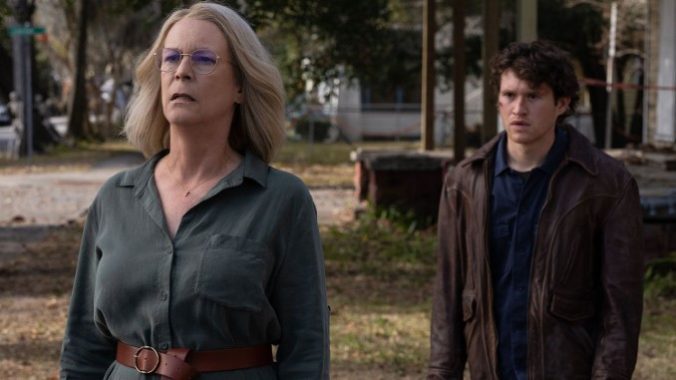Halloween Ends Has Finality, but Mostly It Has Jaw-Dropping Absurdity
Photos via Blumhouse
Director David Gordon Green’s trilogy of modern Halloween movies should have been the easiest of writing assignments. They should have been elemental. They should have been simple. They could have been effective.
Alright, wait a moment. We should note that this absolutely never should have been a “trilogy” to begin with, any more than Peter Jackson’s adaptation of The Hobbit required three films to tell the tale. At the end of the day, this imperative to create an excess of “content” probably played a large role in what led these films astray. But after watching Halloween Ends in particular, you can’t remove Green and his writers from the resulting clusterfuck. They took what should have been a rock-solid central story, and steadfastly refused to commit to it for a good six hours of screentime. To its credit, you can at least say that Halloween Ends does have finality. But good luck enjoying it, when you’re still trying to pick your jaw up from the floor and piece together the film’s inexplicable storytelling. This film is a marvel; a fever dream of absurdity, simultaneously the most wildly ambitious and monumentally misguided horror movie we’ve seen in recent memory.
The pieces were there, to tell a coherent and relevant story. Three generations of Strode women, that’s all you needed. Laurie Strode as the embattled, traumatized grandmother, who has spent the last 40 years living in a nightmare repeat of her harrowing experience in 1978, sure that Michael Myers will return to stalk her again. Karen, Laurie’s daughter, resentful of the life she had to live being raised by a woman cloaked in paranoia, feeling she never truly had a mother because that woman’s only real passion was her vendetta. And Allyson, Laurie’s empathic granddaughter, a young woman naturally curious about her grandmother’s struggle, more receptive to her emotional trauma because it was more distant and less damaging to her own childhood. Together, these three were meant to stand as a bulwark against The Shape that is Michael Myers, as they very briefly do in the most satisfying moment of the entire series, the finale of 2018’s Halloween. So how the hell did not one or two, but all three end up being pushed to the sidelines?
That’s the thing about Green’s Halloween movies—they all seem to suffer from severe attention deficit disorder. The first film doesn’t really focus on the Strode women like we expect it to, because of a strange insistence on dalliances with unimportant side characters. Halloween Kills ramps up this direction again, sticking Laurie in a hospital throughout the movie and holding both Karen and Allyson at arm’s length until the very conclusion. And Halloween Ends ditches them once again, in favor of a brand new protagonist being introduced at the 11th hour. It begs the question: Why were Green and the writers of each film so desperate to avoid the Strode women as primary heroines? Is there a single person in the audience who was clamoring for an introspective look at the life of heretofore unknown Haddonfield resident Corey Cunningham? Why not introduce Corey two films ago, if he’s going to be the crux of the entire series? What did actress Andi Matichak do to piss off these producers, that she was never allowed to become the central star of these movies? What about the granddaughter of Laurie Strode makes her an uninteresting protagonist in Green’s eyes?
Of all things, I can’t help but be reminded of the Star Wars sequel trilogy from J.J. Abrams and Rian Johnson, and the way each entry resents the contributions of the previous one, ignoring and disposing of whatever story each film was trying to build in a game of spiteful one-upmanship. Somehow, it’s the same energy here, despite the fact that the same guy directed all three, something that becomes increasingly hard to believe as Halloween Ends spools out. This is a sequel so tonally unrelated to the two previous films in the trilogy, that it arguably has more in common with Panos Cosmatos’ Mandy than it does with Halloween and Halloween Kills.
Does this mean that some people are going to love Halloween Ends? Yes, it actually does, though rank and file horror fans are no doubt going to hate this movie’s guts. It will be even more inscrutable to the casual slasher fan than it is to the rest of us, but Halloween Ends will simultaneously inspire a small cadre of die-hard, film-savvy defenders who will no doubt praise its ambition, risk-taking and willingness to completely cast everything else from the series to the wind in search of some ephemeral, profound meaning. And those people … will be dead wrong. This trilogy does not deserve your impassioned defense, or insistences that “Haddonfield was the main character” all along, as if that half-baked thought somehow forgives basic lapses in filmmaking.
-

-

-

-

-

-

-

-

-

-

-

-

-

-

-

-

-

-

-

-

-

-

-

-

-

-

-

-

-

-

-

-

-

-

-

-

-

-

-

-








































